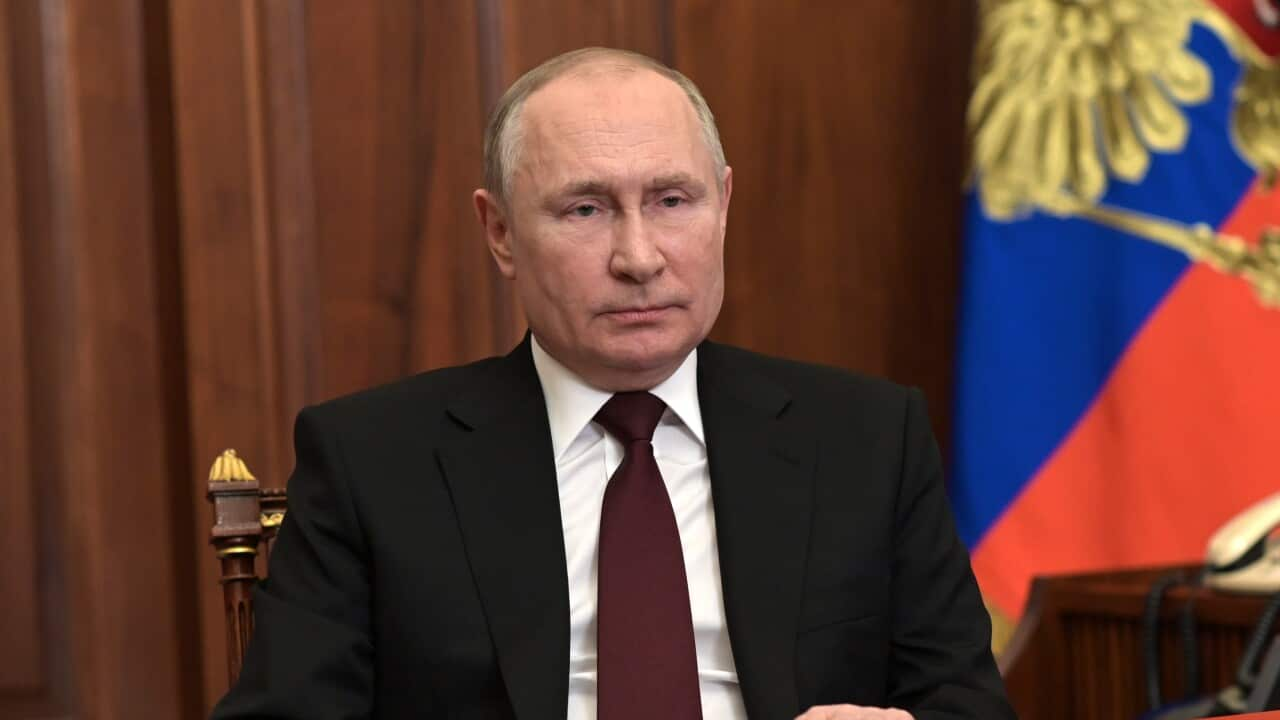Australia, the United States, the European Union and the United Kingdom have all announced new sanctions on Russia, as Washington said the invasion of Ukraine has already begun.
The sanctions have come after Russian President Vladimir Putin recognised two separatist regions in Ukraine, Donetsk and Luhansk - together known as Donbas - as independent states.
s after he convened an urgent National Security Committee meeting on Wednesday morning to follow in the footsteps of his Western counterparts.

Prime Minister Scott Morrison announces new sanctions imposed against Russia to the media in Sydney. Source: AAP / BIANCA DE MARCHI/AAPIMAGE
What sanctions have been imposed so far?
In Australia, Mr Morrison announced sanctions on the following Russian banks: Russia's military bank called Promsvyazbank, Rossiya Bank, IS Bank, the General Bank and the Black Sea Bank.
Australia had previously placed sanctions against Russia in 2014 when its troops annexed Ukraine's southern province of Crimea.
But these new restrictions have escalated to what has been described as a "first round" of sanctions, particularly in the breakaway regions that Mr Putin has described as independent entities.
In Donetsk and Luhansk, sanctions will be placed on transport, energy, telecommunications sectors, and oil, gas and mineral reserves.
Australia has also placed sanctions on eight of the Russian Federation's national security council members who are closely linked to Mr Putin. The federal government hasn't yet provided the details of who these council members are.
Mr Morrison said these sanctions were a necessary response to "stand up to the bully" that is Russia.
"Russia is behaving like thugs and bullies, and they should be called out as being thugs and bullies," he said.
How about the US and Europe?
European foreign ministers agreed to sanction 27 individuals and entities, including banks financing Russian decision-makers and operations in the breakaway territories.
The package of sanctions also includes all members of the lower house of the Russian parliament who voted in favour of the recognition of the breakaway regions.
US sanctions will begin against Russian elites - Petr Mikhailovich Fradkov, Vladimir Sergeevich Kiriyenko and Denis Aleksandrovich Bortnikov - and their family members.
Britain imposed sanctions on Gennady Timchenko and two other billionaires with close links to Mr Putin, and on the same five Russian banks that Australia has punished as well.
These lenders are relatively small and only Promsvyazbank is on the Russian central bank's list of systemically important credit institutions.
Bank Rossiya is already under US sanctions since 2014 for its close ties to Kremlin officials, so Washington's new sanctions were placed on Promsvyazbank and VEB bank.
It also ramped up prohibitions on Russian sovereign debt, which US President Joe Biden said meant the Russian government would be cut off from Western financing.
Germany gets tough on its gas partner
In a surprising move, Germany's Chancellor Olaf Scholz halted the process of certifying the gas pipeline Nord Stream 2 that connects Russia's energy sector to Germany and the rest of Europe.
The US$11 billion ($15.22 billion) project is owned by Russia’s energy giant Gazprom that was set to increase Europe's dependency on Russia for gas, a worry that had long been expressed by the US.
The pipeline is filled with gas and ready for use, but Mr Scholz's decision to prevent its operation was made a day after Mr Putin ordered his troops into the breakaway territories to "keep the peace".
While the freezing of Nord Stream 2 is not formally deemed as a sanction, Germany's decision acts as a warning to Russia that its deployment of troops into Donbas is not accepted.
Meanwhile, Russia's deputy chairman of its security council Dmitry Medvedev criticised Germany's move, foreshadowing gas prices across Europe will soar without Nord Stream 2.
"Welcome to the brave new world where Europeans will soon have to pay 2,000 euros for 1,000 cubic metres," he wrote on Twitter.
Will this hit Russia hard?
The new sanctions against Russian banks focus on smaller lenders, but Russian bankers or their Western counterparts with links to the country will be wary of the potential impacts.
Russia's large banks are deeply integrated into the global financial system, meaning sanctions on the biggest institutions could be felt far beyond its borders.
The measures targeting banks are not yet as extensive as those imposed after Russia's annexation of Crimea in 2014, although many of those sanctions remain in place.
Back then, the West blacklisted specific individuals, sought to limit Russia's state-owned financial institutions' access to Western capital markets, targeted the bigger state lenders and imposed widespread limits on the trade of technology.
Britain's latest measures refrained from imposing limits on the biggest state banks, cutting off capital for Russian companies, or ejecting other prominent so-called Russian oligarchs from Britain.
"The [US sanctions] today were not that significant," said Samuel Charap, a senior political scientist at the non-profit, non-partisan RAND Corporation.
"I think there is a high probability of significant further Russian military action and I think, in that case, we are likely to see some of the really qualitatively more devastating measures than in the past."
What would be the most significant sanction?
The most severe sanction has not yet been announced but Western leaders aren't too hasty to rule it out just yet.
That's the potential move to ban Russia from accessing the worldwide payment system, Society for Worldwide Interbank Financial Telecommunication (SWIFT).
If the UK, US and EU move forward with this sanction, it would cripple Russia's ability to conduct global trade.
Such a move would hit Russian banks hard but the consequences are complex and could create a negative ripple effect on Europe too.
Banning SWIFT would disadvantage European creditors, as they would also be blocked from receiving the funds they owe.
With Reuters, AAP.












